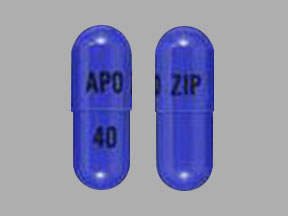
Ziprasidone Coupons & Savings Card – Discount Prices from $19.19
Generic for: Geodon
Ziprasidone, known by the brand name Geodon, is an atypical antipsychotic medication that is primarily used to treat schizophrenia and bipolar I disorder in adults. This medication functions by adjusting the balance of certain chemicals in the brain, specifically targeting dopamine and serotonin levels, which can improve mood, thinking, and behavior. Ziprasidone is usually administered orally twice a day, but it can also be given via injection by a healthcare provider to manage agitation in schizophrenia. Some side effects may include sleepiness, nausea, and involuntary body movements. It is important to consult with a healthcare professional before starting any new medication to ensure it is safe and appropriate for your individual health needs.
Our coupons are free to use. Before paying, show the pharmacist your Ziprasidone savings card to get your free discount. Use our filters below to edit the prescription box to match your needs. The Ziprasidone prices will update based on your prescription needs. Above our Ziprasidone coupons, you can change your location to see pharmacy prices and costs in other areas. We're here to help you buy Ziprasidone at the lowest price with our prescription discount card.
My prescription
Edit
40MG, Ziprasidone (60 Capsules)
Select pharmacy

CVS
$24.77
COUPON PRICE
Walmart
$19.19
COUPON PRICE
Walgreens
$23.22
COUPON PRICE
Albertsons
$30.55
COUPON PRICEZiprasidone savings card
Show this card to your pharmacist
Walmart
$19.19
BIN
ID
PCN
GRP
019876
LH8BEDCFF7
CHIPPO
LHX
Powered by
Ziprasidone, known by the brand name Geodon, is an atypical antipsychotic medication that is primarily used to treat schizophrenia and bipolar I disorder in adults. This medication functions by adjusting the balance of certain chemicals in the brain, specifically targeting dopamine and serotonin levels, which can improve mood, thinking, and behavior. Ziprasidone is usually administered orally twice a day, but it can also be given via injection by a healthcare provider to manage agitation in schizophrenia. Some side effects may include sleepiness, nausea, and involuntary body movements. It is important to consult with a healthcare professional before starting any new medication to ensure it is safe and appropriate for your individual health needs.
Our coupons are free to use. Before paying, show the pharmacist your Ziprasidone savings card to get your free discount. Use our filters below to edit the prescription box to match your needs. The Ziprasidone prices will update based on your prescription needs. Above our Ziprasidone coupons, you can change your location to see pharmacy prices and costs in other areas. We're here to help you buy Ziprasidone at the lowest price with our prescription discount card.
More prescriptions for schizophrenia
coupons from$102.41Save 63%
coupons from$6.37Save 82%
coupons from$102.41Save 63%
coupons from$892.61Save 16%
coupons from$36.65Save 51%
coupons from$10.52Save 95%
coupons from$604.09Save 15%
coupons from$6.26Save 92%
More prescriptions for schizophrenia
Asenapine Save 63%coupons from $102.41
Quetiapine ER Save 82%coupons from $6.37
Saphris Save 63%coupons from $102.41
Molindone Save 16%coupons from $892.61
Paliperidone ER Save 51%coupons from $36.65
Seroquel Save 95%coupons from $10.52
Zyprexa Relprevv Save 15%coupons from $604.09
Abilify Save 92%coupons from $6.26
Ziprasidone dosage forms
Use our Ziprasidone 20MG coupon with prices from $2.74 for 1 Capsule. You can also use our Ziprasidone 20MG coupon with prices from $7.34 for 20 Capsules. We have a Ziprasidone 20MG coupon with prices from $12.19 for 40 Capsules. You can use our Ziprasidone 20MG coupon with prices from $17.03 for 60 Capsules.
Dosage Quantity Price from Per unit 20MG 1 Capsule $2.74 $2.74 20MG 20 Capsules $7.34 $0.37 20MG 40 Capsules $12.19 $0.30 20MG 60 Capsules $17.03 $0.28 20MG 80 Capsules $25.58 $0.32 40MG 60 Capsules $19.19 $0.32 40MG 1 Capsule $2.78 $2.78 40MG 20 Capsules $8.06 $0.40 40MG 40 Capsules $13.63 $0.34 40MG 80 Capsules $26.92 $0.34
| Dosage | Quantity | Price from | Per unit |
|---|---|---|---|
| 20MG | 1 Capsule | $2.74 | $2.74 |
| 20MG | 20 Capsules | $7.34 | $0.37 |
| 20MG | 40 Capsules | $12.19 | $0.30 |
| 20MG | 60 Capsules | $17.03 | $0.28 |
| 20MG | 80 Capsules | $25.58 | $0.32 |
| 40MG | 60 Capsules | $19.19 | $0.32 |
| 40MG | 1 Capsule | $2.78 | $2.78 |
| 40MG | 20 Capsules | $8.06 | $0.40 |
| 40MG | 40 Capsules | $13.63 | $0.34 |
| 40MG | 80 Capsules | $26.92 | $0.34 |
| 60MG | 1 Capsule | $2.87 | $2.87 |
| 60MG | 20 Capsules | $9.90 | $0.49 |
| 60MG | 28 Capsules | $12.87 | $0.46 |
| 60MG | 30 Capsules | $13.61 | $0.45 |
| 60MG | 40 Capsules | $17.31 | $0.43 |
| 60MG | 60 Capsules | $24.71 | $0.41 |
| 60MG | 80 Capsules | $29.45 | $0.37 |
| 80MG | 1 Capsule | $2.82 | $2.82 |
| 80MG | 20 Capsules | $8.91 | $0.45 |
| 80MG | 28 Capsules | $11.47 | $0.41 |
| 80MG | 30 Capsules | $12.11 | $0.40 |
| 80MG | 40 Capsules | $15.32 | $0.38 |
| 80MG | 60 Capsules | $21.73 | $0.36 |
| 80MG | 80 Capsules | $32.25 | $0.40 |
| 80MG | 90 Capsules | $37.84 | $0.42 |
